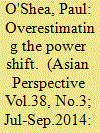| Srl | Item |
| 1 |
ID:
179950


|
|
|
|
|
| Summary/Abstract |
President Donald Trump’s “America First” policy questions the fundamentals of the global U.S.-led alliance network. Where other allies implemented hedging strategies, Japan’s Prime Minister Abe Shinzō pledged to “make the alliance even greater,” insisting that the bilateral ties were “airtight” and “stronger than ever before.” However, Trump’s approach to trade, détente with North Korea, and off-the-cuff remarks regarding nuclear weapons invigorated criticism in Japan: the U.S. is an unreliable partner and Japan needs to prepare for life after the alliance. We argue that Abe’s embrace of Trump was successful in staving off the worst, maintaining stability at the cost of personal humiliation and certain trade and security interests. However, Trump’s cavalier treatment of Japan has laid bare the realities of the alliance, potentially revitalizing a more autonomous discourse of alternatives to the current and often “humiliating” modus in alliance management.
|
|
|
|
|
|
|
|
|
|
|
|
|
|
|
|
| 2 |
ID:
133968


|
|
|
|
|
| Publication |
2014.
|
| Summary/Abstract |
In 2009 the Democratic Party of Japan came to power promising a foreign policy shift, aiming for a more equal relationship with the United States and improved relations with Japan's Asian neighbors. The policy shift was explicitly designed as a response to a perceived regional and global power shift from the United States to China. However, within nine months the new prime minister, Hatoyama Yukio, resigned, and his successors jettisoned the foreign policy shift. Conventional explanations cite the weak leadership of Hatoyama, the inexperience of his party, and the lack of realism behind the proposed policy shift itself as key factors in the shift's failure. In this article I provide an alternative perspective. Drawing on the concept of discursive power, I demonstrate how Washington turned the Futenma base relocation and other issues into a major crisis in Japan-US relations in order to discredit Hatoyama and the policy shift. What was arguably a modest and pragmatic policy shift was narrated as a grave threat to the very cornerstone of postwar Japanese security. By focusing on the US exercise of discursive power over Japan, I suggest that talk of an East Asian power shift is premature.
|
|
|
|
|
|
|
|
|
|
|
|
|
|
|
|